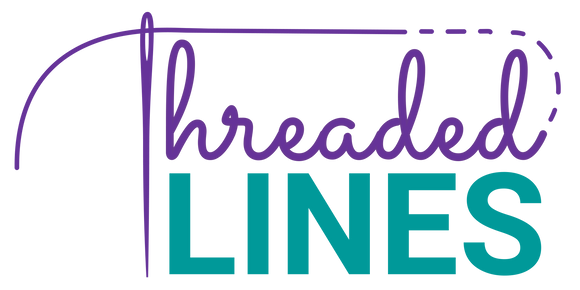We know the different types of threads can be confusing! Many times, there is no one size fits all. Hopefully, this pros and cons list helps you!
Cotton
- Pros:
- Natural and Soft: Made from natural fibers, giving it a smooth, soft feel.
- Heat-Resistant: Handles high ironing temperatures well, making it great for quilting and piecing.
- Dyeable: Takes dye easily, resulting in vibrant colors.
- Low Stretch: Provides stability for seams that need to stay in place.
- Cons:
- Low Elasticity: Not suitable for stretchy fabrics.
- Can Weaken Over Time: Prolonged exposure to light and washing can weaken the fibers.
- Higher Lint Production: Can produce more lint compared to synthetic threads.
Polyester
- Pros:
- Strong and Durable: Resistant to breaking, making it great for seams that undergo stress.
- Elasticity: Has a bit of stretch, ideal for knits and stretch fabrics.
- Shrink-Resistant: Maintains its shape and strength even after washing.
- Versatile: Suitable for a wide range of fabrics and projects.
- Cons:
- Heat Sensitivity: Can melt under high ironing temperatures.
- Less Natural Feel: Might not feel as soft as cotton or silk.
Silk
- Pros:
- Luxurious and Smooth: Feels exceptionally smooth and soft, with a natural sheen.
- Fine: Great for delicate fabrics and intricate stitching.
- Strong: Despite its fine nature, silk is strong and durable.
- Cons:
- Expensive: Generally more costly than other thread types.
- Less Durable: Can weaken if exposed to prolonged sunlight or harsh chemicals.
- Limited Color Range: Can be more challenging to find in a wide range of colors.
Nylon
- Pros:
- Very Strong: Excellent tensile strength, suitable for heavy-duty projects like upholstery and outdoor gear.
- Elastic: Stretches well, making it great for active-wear and swimwear.
- Resistant to Mildew and Rot: Ideal for outdoor applications.
- Cons:
- Can Yellow Over Time: Especially when exposed to sunlight.
- Less Natural Appearance: Doesn’t blend as seamlessly with natural fabrics.
Rayon
- Pros:
- Bright and Shiny: Offers a vibrant, glossy finish, perfect for decorative stitching and embroidery.
- Smooth: Glides easily through fabrics without causing snags.
- Variety of Colors: Available in a wide range of shades.
- Cons:
- Weaker: Not as strong as cotton or polyester, can break more easily.
- Less Heat-Resistant: Can be damaged by high ironing temperatures.
- Not Ideal for Structural Seams: Best used for decorative purposes rather than holding fabric together.
Wool
- Pros:
- Warm and Stretchy: Ideal for knitwear and heavy fabrics.
- Textured: Adds a unique, textured look to projects.
- Natural Insulation: Provides warmth and comfort.
- Cons:
- Bulky: Can be too thick for delicate fabrics.
- Can Shrink: May shrink if not cared for properly.
Metallic
- Pros:
- Decorative Appeal: Adds sparkle and shine to projects, perfect for festive and decorative items.
- Strong: Often made with a core thread wrapped in metal foil, providing durability.
- Cons:
- Difficult to Work With: Can be stiff and prone to breaking.
- Expensive: Generally costs more than regular thread types.
Which is your go-to thread?
Although we do not carry all these threads, we do carry cotton and polyester which are mostly used in quilting and bag-making. Next week, we delve into the weights - so stay tuned!



